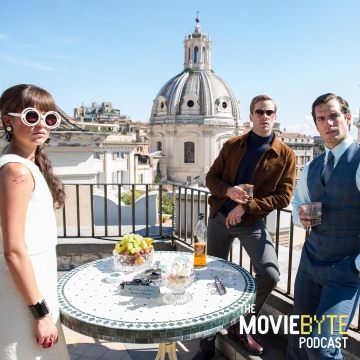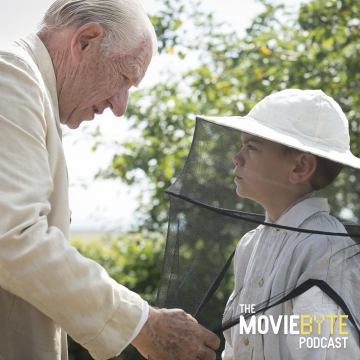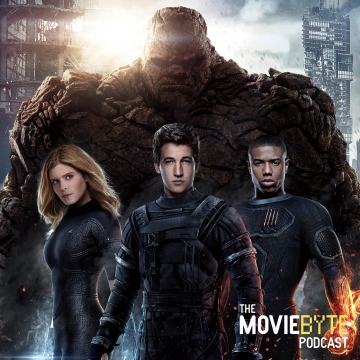Give a warm welcome to Ben Riley and his first contribution to MovieByte. To be honest, I have been wanting to bring someone onto MovieByte that both tends to have different opinions than my own, and who tends to watch and enjoy different types of films than I do as well. I believe Ben matches that description. As such, he has kindly watched and submitted his first film review of The Double which I was only slightly interested in.
Enjoy!
— TJ
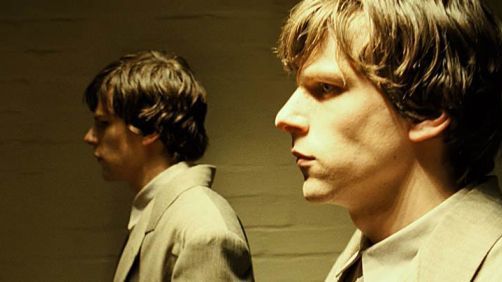
Richard Ayoade’s The Double is a film that is interesting because, like so many art films, it simultaneously invites and defies interpretation. I could argue that it is an unusual study of masculine self realization; or perhaps, I might say that it is a disturbing depiction of primal male impulses. Is it about individuality being suppressed by the demands of corporate society? Or perhaps a thoughtful rumination on the unique identity? Is it a study on the way a perceptive individual struggles with anima and persona? The Double is, perhaps, all of these things; it is possible that it is none of them.
Because of it’s highly unusual, surreal, abstract narrative, loosely inspired by Dostoevsky’s classic novella, it is likely that audiences will respond very strongly by either loving or hating it. The Double‘s quasi experimental penchant, in its broader context, fits into what appears to be a movement in British independent art cinema toward surrealist atmospheric filmmaking exemplified in such recent films as A Field in England, Killing Fields (Ben Wheatly), and Under the Skin (Jonathan Glazer).
But if it is mysterious in meaning and experimental in method, The Double will not prove inaccessible to open minded viewers. It does demand to a certain degree that audiences cast off conventional expectations and lose themselves to its often slow pace and dark sense of humor. Still, it is a wildly imaginative, original, and entertaining film, suffused with a biting wit and a comedic edge as black as death.
The plot, put forward simply, concerns Simon (Jesse Eisenberg), self described as lost, lonely, and invisible — a corporate drone enduring the plight of constantly unrewarded effort and unrequited affection for Hannah (the ever disarming Mia Wasikowska, who gives the film some much needed heart), a pretty coworker to whom Simon feels an intuitive connection. His delicate balance of mediocre miseries is upset when a position at his workplace is filled by James (also Eisenberg), Simon’s identical physical replica but polar opposite in temperament, attitude, and morals. Simon is timid, mousy, and rather delicate of spirit, while James is aggressively self interested, ferocious, and unscrupulous. To Simon’s horror and increasing mental agitation, James slowly begins to takeover his life.
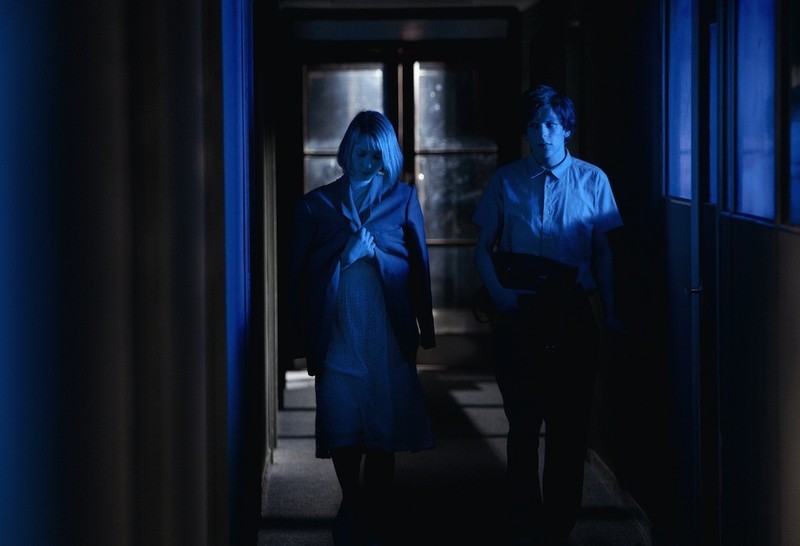
Eisenberg deserves top props for his performance. After an Oscar nominated breakout as icy genius Mark Zuckerberg in The Social Network (2010), Eisenberg has avoided being absorbed into the blockbuster culture of surrogate acting for big paychecks, instead quietly building an impressive filmography of fine performances in a large variety of smaller movies. Here he does accomplished work with the insidious James, making him both devilishly charming and thoroughly sleazy. But he truly shines as Simon, who’s very clothing appears to overwhelm him, which gives him the requisite aura of chronic shyness and discomfort before he becomes unhinged in a genuinely terrifying way during the nail-bitingly intense third act.
However, the true star of this show is British director Richard Ayoade. His dystopian vision is profoundly unique and unsettling, shot through with shadows, smoke, and blackness, seemingly lacking a sun, textured with an unobtrusively rich color palette, and full of an inspired mix of retro and futuristic. Auditory and visual elements seam almost perfectly, as the playfully ominous score and paranoid sound design complement the unsettlingly otherworldly landscape, a fantasy world with fewer connections to reality than Harry Potter. All elements conspire to create an atmospheric experience that is perhaps evocative of Simon’s perception of the world as oppressive, demeaning, and impossible to negotiate. This puts The Double in a tradition of character centric mise-en-scène that goes all the way back to the German expressionist films of the 1920s.
Because Ayoade’s film is both intriguing and alienating — at once drawing the audience in and holding them at a distance — I suspect that casual entertainment seekers will likely despise it. But those who become weary of the cycle of indistinguishable blockbuster clones will be intrigued and refreshed by its abnormality. In the end, in an American film culture where sights, sounds, and narrative are codified to a strict crowd pleasing set of norms, Ayoade’s originality provides a much needed relief. And though it will baffle and enrage the conventionally minded, The Double achieves a sense of playfulness that is too often absent from experimental cinema.
The Double is available in select theaters and on iTunes and other VoD services. Rated R; Language, bloodshed, some vulgar dialogue
